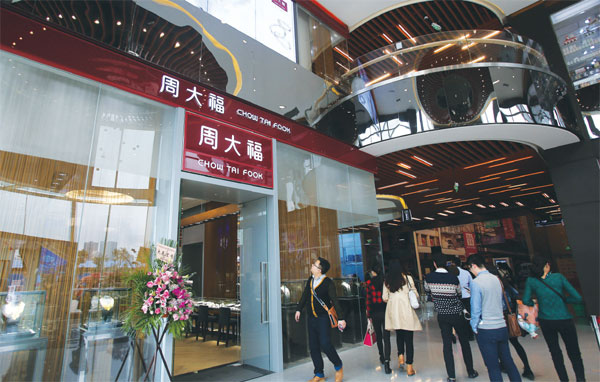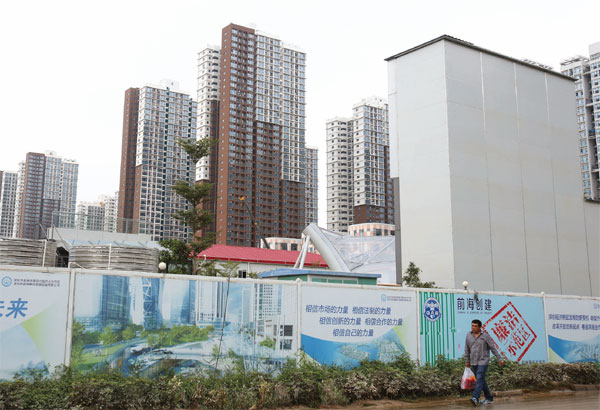Hong Kong enterprises revving up in Qianhai
Updated: 2016-05-13 06:19
By Zhou Mo(HK Edition)
|
|||||||||
|
Customers at the Qianhai Chow Tai Fook Global Goods Shopping Centre in Shenzhen. Chow Tai Fook Jewellery Group Chairman Henry Cheng Kar-shun said last month he planned to set up a head office in Qianhai to expand his business on the mainland. Parker Zheng / China Daily |
|
A view of Qianhai in Shenzhen. For Hong Kong entrepreneurs, a major concern running a business in Qianhai is Shenzhen's soaring homes prices and their impact on personnel recruitment. Parker Zheng / China Daily |
Shenzhen special zone seals new projects on its first anniversary despite high rents, competition. Zhou Mo reports from Shenzhen.
Hong Kong is poised to reap fresh business opportunities with the signing of new co-operative projects between the SAR and Shenzhen in the Qianhai special economic zone just a year after the zone's inception.
The sealing of new strategic pacts last month in the zone, which offers preferential policies, especially for startup companies, would be a boon for various enterprises which will also need to gear themselves to meet the challenges amid a competitive environment, as well as skyrocketing commercial rents arising from Shenzhen's runaway property sector.
April 27 marked the first anniversary of the creation of Shenzhen's Qianhai and Shekou zones as part of the China (Guangdong) Pilot Free Trade Zone (FTZ), which also covers Nansha in Guangzhou and Hengqin in Zhuhai.
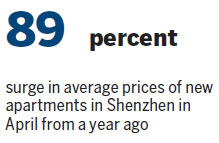
The first innovation and entrepreneurship contest for Shenzhen and Hong Kong youths was launched at a ceremony as part of Qianhai's efforts to step up exchanges and understanding among youths from both cities, and stimulate Hong Kong entrepreneurs' enthusiasm in setting up business across the border.
Amy Fung Dun-mi, deputy executive director of the Hong Kong Federation of Youth Groups, said Qianhai offers an ideal ground for entrepreneurs and innovators from the SAR to turn their ideas into reality, as the risk of failure is lower there compared with Hong Kong, where high office rents and labor costs, and limited market space are a big setback.
"It's wise for them to tap into the mainland market," she said, pointing out that those in the Internet and cultural and creative industries are particularly encouraged to take advantage of Qianhai's platform because the cost of setting up business in those sectors is very low.
A special hub was set up in Qianhai in December 2014 to help enterprises grow. The Qianhai Shenzhen-Hong Kong Youth Innovation and Entrepreneur Hub (E hub) offers one-year, rent-free offices, onsite residence, training, funding opportunities and other preferential incentives to entrepreneurs. So far, 59 Hong Kong teams have settled down in the E hub.
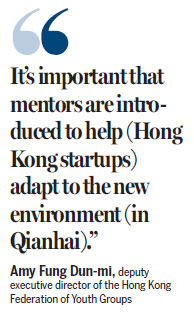
Jordan Lam's team is one of them. Having moved to Qianhai in March this year, he now rents a 70-square-meter apartment in the Nanshan district together with a friend, paying a monthly rent of 6,000 yuan ($920).
For the Hong Kong entrepreneur, a major concern running a business in Qianhai is Shenzhen's soaring homes prices and their impact on personnel recruitment.
"Housing rents in Qianhai are too high, imposing a heavy burden on our employees, especially fresh university graduates," said Lam, director of Fusquare Technology Co, which specializes in providing intelligent control systems for buildings, including ventilation, light, security surveillance and control.
"Among 10 people I interviewed recently, several who live in Shenzhen showed interest in joining us, while others were worried about their ability to afford expensive rents. High property prices in the city have had a deep impact on us in trying to attract talents," he said.
Average new apartment prices in Shenzhen stood at 49,876 yuan per square meter last month, having surged 89 percent year-on-year, while average monthly rents for apartments in the city reached 5,735 yuan, according to Centaline Property.
Lam also cited marketing as the biggest challenge for his company. "Although there are officials coming to E hub every week, they mainly talk about big things, like the direction of development. Real communication between them and us are few," he told China Daily, suggesting that more small-scale activities targeting specific industries be held so that Hong Kong entrepreneurs can get more concrete help on how to develop on the mainland.
According to Fung, some Hong Kong startups are not "making much progress" in Qianhai as they find it hard to operate there due to the difference in legal and business regulations, as well as culture and the environment, between Hong Kong and the mainland.
"It's important that mentors are introduced to help them adapt to the new environment," she reckoned.
Despite the challenges, Qianhai is still held as an attractive place for Hong Kong businesses with its preferential policies, open environment and innovation.
According to official statistics, more than 91,000 enterprises had been registered in Qianhai as of April 15 this year, including more than 3,100 Hong Kong-funded companies, which contribute almost one third of the zone's tax revenue.
Tian Fu, director of the administrative committee of Qianhai and Shekou, said Qianhai will continue to promote Shenzhen-Hong Kong personnel cooperation, providing tax subsidies to Hong Kong talents and giving greater access to Hong Kong professionals to work in the zone.
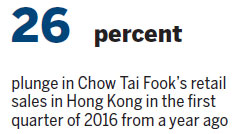
"We'll continue to focus on cross-border cooperation between Shenzhen and Hong Kong, and strive to create a platform to support Hong Kong's stability and prosperity," he said, stressing that one-third of the land in Qianhai will be provided to Hong Kong enterprises.
Chow Tai Fook Enterprises (CTF) is one Hong Kong company that's enjoying such a privilege. The Qianhai Chow Tai Fook Global Goods Shopping Centre, built and managed by CTF, is gaining popularity among mainland consumers, who had to spend hours traveling to Hong Kong in the past to buy local and imported products, which they believe are cheaper and of higher quality.
More than 20 stores, including cosmetics store chain Sa Sa, clothes retailer ISA and Maxim's Cakes, have set up shop at the shopping complex. The mall's much bigger second phase is due to come into operation soon.
CTF signed a strategic cooperative agreement with Qianhai Authority at the ceremony marking the zone's first anniversary last month. CTF Chairman Henry Cheng Kar-shun said last month he planned to set up a head office in Qianhai to expand his business on the mainland. "We hope to get a site as soon as possible."
The move came as the jewelry chain continues to face sluggish sales in Hong Kong following a steep drop in the number of mainland visitors to the SAR. CTF's retail sales tumbled 26 percent year-on-year during the period from January to March, compared with a 20-percent fall between October and December last year.
Cheng said he's upbeat about business prospects in Qianhai, and will explore ways of developing financial-related services in the zone, taking advantage of its innovative financial policies.
Contact the writer at [email protected]
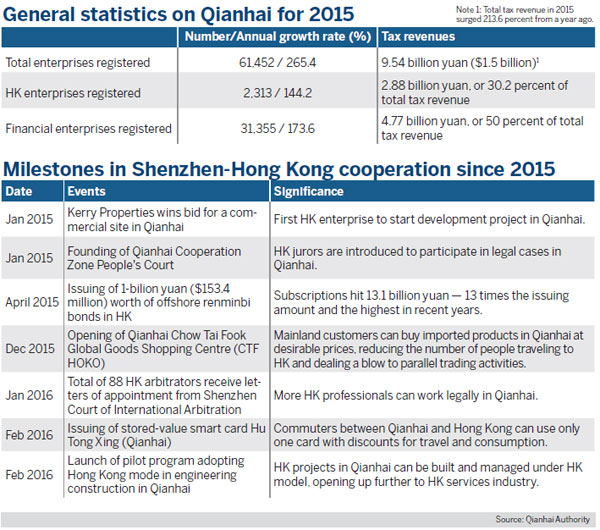
(HK Edition 05/13/2016 page8)
